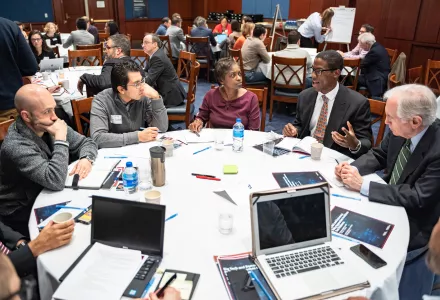
Policy Approaches to Address Tech Platforms
Technology has reached a critical juncture in American society. The unfettered optimism of recent decades is now tempered by rising concerns over privacy and security, the impact of disinformation campaigns, and increasing calls for digital accountability. It is clear that the 116th Congress will face pressure to shape technological innovation through policies that protect and serve the best interests of their various constituents.
In March, two projects at Harvard Kennedy School—the Technology and Public Purpose (TAPP) Project at the Belfer Center and the Platform Accountability Project at the Shorenstein Center for Media, Politics and Public Policy—hosted a workshop in the Capitol Visitors’ Center for congressional staff to identify and discuss policy approaches to the dilemmas of big tech platforms. The day-long workshop sought to create an open space for discussion among congressional staffers and experts in the field, and included chiefs of staff, committee counsels, and legislative directors from both Senate and House offices.
In his opening comments, Belfer Center Director and former Secretary of Defense Ash Carter, who heads the Belfer Center’s TAPP Project, emphasized the responsibility that policymakers have in shaping emerging technology. By drawing parallels to other “disruptive tech” from the past, such as nuclear technology, Carter stressed the historic opportunity to shape today’s technology for the human good: “Once invented, it can’t be undone.” Carter said case studies from other revolutionary communication technologies—such as the postal service, telegraph, radio, and telephone—can provide insight into the existing toolbox of self-regulation, antitrust, and regulatory solutions.
The opening panel featured experts who were centrally involved with some of the major reforms in telecommunications and media. They included: Toni Bush, former Senate Commerce Senior Counsel; Mignon Clyburn, former FCC Commissioner; Dipayan Ghosh, Pozen Fellow at the Shorenstein Center and former Privacy and Public Policy Advisor at Facebook; Gene Kimmelman, former Chief Counsel of the Justice Department’s Antitrust Division; Hong Qu, Program Director for Technology at the Shorenstein Center and former User Interface Designer at YouTube; and Tom Wheeler, former FCC Chairman.
The panelists explored the multitude of issues at play in the big tech space, such as competition, content accountability, privacy and security, accessibility, and protection of civil rights and liberties. They agreed that any path toward sustainable policy solutions must begin with a public debate and that Congress has a critical role in setting this agenda by launching hearings and engaging diverse actors.
The discussions surfaced four key insights on tech policy challenges facing Congress and how legislators could more effectively engage with the dilemmas of big tech:
- The digital marketplace and new business models are creating gaps in governance authority and coordination;
- A healthy mix between self-regulation and government policy is necessary;
- Congressional hearings are underutilized on technology-relevant topics;
- Tech policy debates are still ‘pre-partisan.’
The current tech policy environment is nascent and presents a rare opportunity to advance sustainable solutions through a united, bipartisan front.
Belei, Bogdan. "Big Tech and Deomocracy: Policy Approaches to Address Tech Platforms." Belfer Center Newsletter. Belfer Center for Science and International Affairs, Harvard Kennedy School (Summer 2019).




